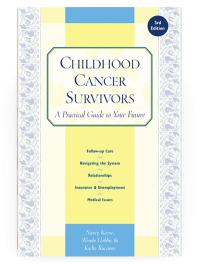Childhood Cancer Survivors
Anxiety and depression
Anxiety and depression can be seen as two sides of the same coin. For many survivors, anxiety is fear related to losses that may occur in the future, while depression is sadness related to losses that occurred in the past. Both of these emotions are a normal part of anyone’s life, but both can become troublesome for survivors.
In the case of anxiety, survivors can become focused on the fear of a relapse or fear of late effects. If the anxiety grows too large, it may compromise a survivor’s ability to seek appropriate healthcare. In essence, the survivor becomes afraid of knowing. Sometimes survivors become embarrassed or ashamed of their concerns about their health and body. After all, young adults aren’t generally worried about things such as cancer or heart problems. So normal health concerns for survivors may make them feel strange and out of step with their peers.
Just before the 11-year anniversary of my Hodgkin’s diagnosis, I began seeing a psychologist who specializes in young adults with chronic and life-threatening illnesses. It has truly been the best decision I’ve ever made, and I’m glad that I was able to ignore the stigma enough to realize that there is nothing wrong with some good old-fashioned talk therapy.
I have friends and family, but there are some things you just can’t say to them no matter how close you are. In working with my psychologist, I’ve rediscovered a lot of the best parts of my pre-cancer self, worked out a lot of my stressors, and just vented my spleen (or should I say the area where my spleen would be?) about issues. It has truly helped me feel less stressed, more at peace, and—well, there’s no truly good word for the feeling. I wish this was something I could have started years ago.
Some survivors worry that they are hypochondriacs—that they are overly concerned about their health. They become fearful that their doctors will view them as complainers or find their health worries crazy. This type of anxiety can interfere with getting good, thorough follow-up care. Anxiety that interferes with life in this way can be crippling and detrimental. Survivors who feel extreme anxiety should seek help from a professional. There are many ways to reduce anxiety and not allow it to overwhelm your life.
Depression should be distinguished from the normal sadness about the real losses that can occur from treatment. Sadness can arise from temporary losses, such as the loss of hair, to permanent losses, such as the loss of fertility or mobility. Depression takes over normal sadness when a person is only able to focus on the losses and can no longer find any pleasure in life. It can become crippling and prevent the survivor from seeking and getting appropriate care and from enjoying the positive aspects of life.
When people are profoundly depressed, they may feel life is not worth living, or that they are not worthy of care and help. They often lack the energy to participate in activities that used to interest them, and they may withdraw from important relationships and social interactions. These feelings make it especially hard for them to get the help they need, both physically and emotionally. No one should have to suffer alone through depression; it can be successfully treated with counseling and/or medications.
There was a time after I finished treatment when my sadness and grief had clearly turned to depression. I found that life was bitter and sour, and I couldn’t find joy or relief anywhere. I could identify reasons that this was so: Concerns about my health, my infertility, a marriage that had been strained beyond the saving point by my anxieties about a relapse. The reasons for the depression were everywhere I looked, and although I could identify the reasons, know what they were, I could not alter the depression.
In this case, I would say that things that I did and should feel naturally sad about had become twisted into something more than sadness, had become depression. And my internal world was bleak and dark, despite the fact that there were many fine and wonderful things in my external world.
This is when I sought out psychotherapy. I knew I was no longer able to help myself and disentangle the strands that had me caught in such a dark state. And it helped.
Table of Contents
All Guides- 1. Survivorship
- 2. Emotions
- 3. Relationships
- 4. Navigating the System
- 5. Staying Healthy
- 6. Diseases
- 7. Fatigue
- 8. Brain and Nerves
- 9. Hormone-Producing Glands
- 10. Eyes and Ears
- 11. Head and Neck
- 12. Heart and Blood Vessels
- 13. Lungs
- 14. Kidneys, Bladder, and Genitals
- 15. Liver, Stomach, and Intestines
- 16. Immune System
- 17. Muscles and Bones
- 18. Skin, Breasts, and Hair
- 19. Second Cancers
- 20. Homage
- Appendix A. Survivor Sketches
- Appendix B. Resources
- Appendix C. References
- Appendix D. About the Authors
- Appendix E. Childhood Cancer Guides (TM)

